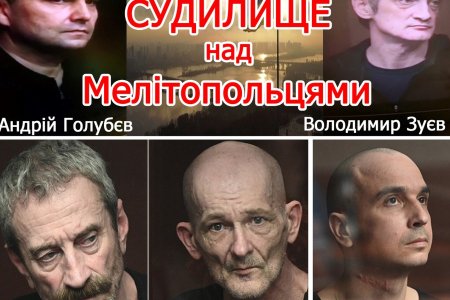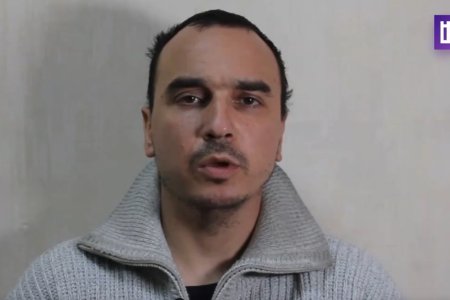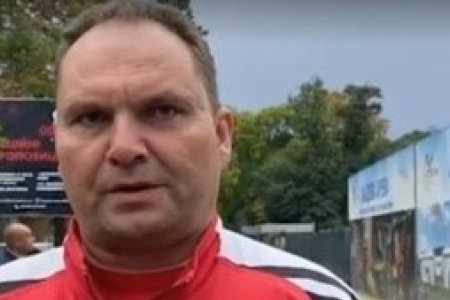
Almost 18 months have passed since Kostiantyn Zinovkin was abducted by the Russian invaders from near his home in occupied Melitopol and a year since he was shown on a Russian propaganda video, together with five Ukrainian Telegram channel administrators abducted considerably later. Russia’s FSB have claimed that Zinovkin planned to blow somebody up, a charge that his wife, Liucienna dismisses as totally insane. Her husband doesn’t eat meat because he doesn’t want to kill animals, and it is nonsensical to suggest that he could have been planning to kill a person.
Zinovkin, now 34, studied engineering, but he and his wife, Liucienna had travelled in Ukraine and abroad, as dancers, while saving to begin their own business. Liucienna was in Kyiv when Russian began its full-scale invasion of Ukraine, Kostiantyn – in Melitopol (Zaporizhzhia oblast), one of the first cities which Russia seized. Although he opposed the invasion, and took part in protests until the Russians began opening fire on protesters, Kostiantyn remained in the city to care for his mother and bed-ridden grandmother.
Zinovkin vanished on 12 May 2023, after setting off to the shop. Russia carries out such enforced disappearances in any Ukrainian city it occupies, with families often hearing nothing for months. In this case, having seized Zinvovkin, the Russians took his keys and used them to simply walk into the family’s home. Three men, all wearing balaclavas, told Kostiantyn’s mother that he had been “detained”, though they did not identify themselves. Their supposed ‘search’ of the apartment bore more resemblance to straight plunder since, as well as documents and the computer hard drive, they took all the money they found, as well as the keys to Kostiantyn’s car and the family’s dacha. Kostiantyn’s mother was interrogated for several hours and forced to provide information about all members of the family. At that stage, she was told that her son had been “detained for infringing the regime”, and that he would be released after they had established the circumstances. This proved, as it normally does, to be a lie.
Over the following month and a half, the family heard nothing at all. Then Russians turned up again at the apartment, this time claiming to be ‘investigators’ and saying that Zinovkin had been arrested by the FSB. They asserted that he had ‘confessed’ to planning to blow somebody up. Russia’s admission to imprisoning him did, at least, mean that Zinovkin’s mother was able to travel to the ‘prison’ which the Russian occupiers have established in occupied Chonhar and pass on food and clothing for her son. They have also received letters from him, although it is clear from these that he is not being passed the letters that they write.
At the end of June, Zinovkin’s name appeared on Russia’s notorious ‘list of terrorists and extremists’. There has long been an ominous overlap between the names on this list and that of people recognized as political prisoners by the authoritative Memorial Support for Political Prisoners Project. Since Russia’s full-scale invasion of Ukraine, many of the civilians abducted from occupied territory have also been added. Some of these have already been recognized by Memorial as political prisoners, while in other cases, virtually nothing is known.
Zinovkin’s family know only that he is charged under Articles 30 and 205 of Russia’s criminal code with ‘terrorism’ and a ‘plan to commit a crime’. These ‘criminal proceedings’ were, purportedly, initiated back on 30 May 2023, although the FSB video with Zinovkin came months later, on 29 October that year.
As an occupying state, Russia has no right to apply its legislation on occupied territory, nor to forcibly take Ukrainian citizens to Russia. All of these abductions of civilians are in flagrant violation of international law, as is Russia’s practice of holding both men and women incommunicado and subjecting them to torture. All of this would apply even if the Russian invaders believed Zinovkin to be involved in some kind of partisan activities.
In fact, the secrecy around the charges and the fact that he was first shown on a video together with civic journalists, raise serious doubts about any grounds at all. This would not be the first time that the Russians treat abducted Ukrainians like a joker in a pack of cards or blank tile in Scrablle, to be added to whatever surreal ‘terrorism’ or ‘sabotage’ plot they are concocting.
The Russian propaganda feature on Vesti was mainly about young Ukrainian Telegram channel journalists or administrators whom the Russians had held prisoner for over two months. All of them, including 19-year-old Yana Suvorova, had clearly been tortured and/or terrorized into playing their allocated roles in the propaganda video aimed at intimidating other Melitopol residents into silence and submission. Although entirely clear that the administrations of RIA Melitopol’ and ‘Melitopol is Ukraine’ had been targeted for their role in providing truthful information about Russia’s war of aggression, they were accused of ‘terrorism’ and forced to ‘repent’ on camera. It is likely that Heorhiy Levchenko, administrator of RIA Melitopol had been abducted on or before 20 August 2023 when the channel was hacked into and hijacked, probably around the same time as the other administrators: Yana Suvorova; Mark Kaliush; Oleksandr Malyshev, and Maksym Rupchov.
Without mentioning that he had been abducted much earlier, the program added images of Kostiantyn Zinovkin (spelling his surname as Zenovkin), with the accompany commentary calling him “a zombie”. Such a term, according to the propaganda narrative, was because “he is convinced that Russia in 2014 seized Donbas, that over nine years, neither Donetsk, nor Luhansk, nor other cities of the region were not subjected to daily artillery strikes from Ukraine. He calls his country independent and has no doubt that western weapons are brotherly assistance.” A position, in short, to which only Russia and its allies in aggression object. No mention, in short, is made of anything but what, to the Russian regime, may constitute thought crime, nor is any attempt made to explain why Zinvokin is shown on the same program as the young Telegram administrators.
In April 2024, Liucienna told MediaZona that her husband’s letters had mentioned that he is likely to be ‘tried’ in Rostov-on-Don. This will almost certainly be at the same Southern District Military Court which has been churning out politically motivated sentences against Ukrainians since 2014. He writes that he has a state-appointed ‘lawyer, but tells his family that there is no point in “encouraging” this individual, nor in seeking an independent lawyer since they “do not determine anything.” While the outcome of such ‘trials’ is, almost certainly, predetermined, independent lawyers can at least ensure that details about fabricated (or non-existent) evidence are brought to light, etc. This is one of the reasons why the FSB use torture, threats and other forces of duress to try to prevent Ukrainian political prisoners from receiving independent legal assistance.



